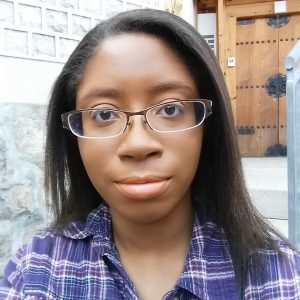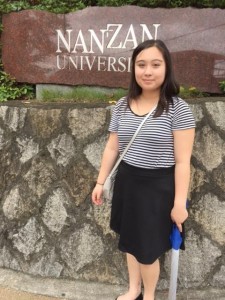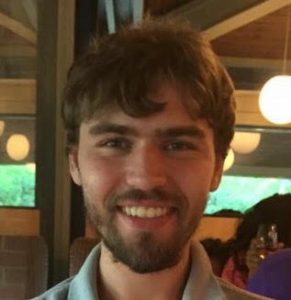 Gabriella Samuels, B.A., Asian Studies (2017)
Gabriella Samuels, B.A., Asian Studies (2017)
Gabrielle has been accepted to the Masters Program in Korean Studies at the University of London (SOAS), one of the top programs in the world. She will begin the one-year program in September 2017.
 Amanda Buker, B.A., Asian Studies (2016)
Amanda Buker, B.A., Asian Studies (2016)
Summer 2017 – After graduating from UMBC with a B.A. in Asian Studies, I applied to the Japan Exchange and Teaching (JET) Program. The program promotes grass roots international exchange between Japan and other nations. At UMBC I focused on Japanese language, history, art and culture. I am now an assistant language teacher (ALT) of English in Japan. The rigorous interview process began in January, and the results were announced in late March. I was not informed about my placement in the program until late May. I found out I was placed in Otobe-cho, Hokkaido, a small town on the southwest coast of the northernmost island of Japan. There, I will be teaching at one middle school and three elementary schools. Classes begin on August 21st, and as of now I am settling into life in Japan after arriving on July 30th in Tokyo for a two day orientation. On August 2nd, I flew to Hokkaido and I have met Otobe-cho’s Board of Education members, as well as some other nearby JET ALT’s. I am excited to meet my students and begin teaching English.
Spring 2016 – Thinking back on my wonderful time studying in Japan (Nanzan University), I cannot believe that it is over as I wish I could have extended my stay indefinitely. My time in Japan has been one, if not the best experience, of my life. Even though it was just for one semester, I feel that it has changed my life and broadened my perspectives on how I view Japan as a culture and a society.
When I first arrived in Japan I was, of course, very excited, but also very nervous. It was my first time traveling so far away on my own and living away from my family, so I was a mix of many different feelings. I stayed with my aunt, her family, and my grandmother in Okazaki, Aichi-ken, about an hour away from Nagoya. Living with family gave me a bit more peace of mind. It was great to be able to spend so much time with them because my last time in Japan was five years ago, and whenever I go to Japan to visit it is only for two weeks at most. Also, none of them were able to speak English so it forced me to use my Japanese and as a result, quickly improve. I was elated to be able to experience Japanese home life as well. But, with their home being an hour and fifteen minutes away from Nanzan University, and having never taken Japanese trains or subways on my own before, I was nervous again. This apprehension was completely alleviated once I went to and from Nagoya a couple times with my aunt. I found the Japanese transportation system to be very precise, punctual, and easy to use; a nice change from the car based commuting I usually did back home. Now that things had settled, the day of orientation grew near and so did my excitement. Finally being able to speak to peers interested in Japan and Japanese culture was what I had been looking forward to most in this experience.
The first day of orientation was very eventful because the first thing everyone did was take a placement test that would affect which level of Japanese each student would take. Being around students from so many different countries was an amazing experience because everyone was likeminded in that they all had an interest in Japan. After orientation, with all the paperwork and placement done, I found that the students, teachers, and organizers at the program were very kind, helpful, and easy to speak with. This greatly added to the enjoyment of my time at Nanzan because I was able to travel, practice Japanese, and experience Japanese life and culture first hand with fellow exchange students and other Japanese students as well. The Japanese program was very well set up because it allowed me to learn Japanese at the level that was most suited to my skill level. It also taught me many useful grammar points and vocabulary words needed for daily life. There were also times every week where we could speak and ask questions to Japanese students, along with special events and field trips meant for the exchange students to meet with and mingle with Japanese students. This was very helpful because the program helped to close the gap between the foreigners and the Japanese students to really make most out of the experience. Many people’s goals were to make Japanese friends in order to practice speaking with a native speaker. Also, it was so much fun to speak and hear the opinions of the Japanese students on foreigners in Japan, and their views on foreign culture.
The classes offered at the program were also very interesting and informative. I took Japanese economy, Japanese culture and art, translation, sumie (ink painting), and a reading and grammar Japanese class. They were well taught and each class, besides sumie and Japanese, were taught in English. It was much like a lecture based class that I was used to at my home university so it was comfortable in that aspect. Each Japanese class became a sort of family because we would meet every day of the week and regularly practice speaking together. At the end of the program as a goodbye party, everyone in my Japanese class went to an izakaya together which was probably one of the most fun experiences I had with my classmates. I really became close to everyone in the class, and was grateful that everyone was kind and supportive of one another. As Japanese class was not as easy as everyone expected, it was nice to know that we could all depend on one another. I was also able to visit a Japanese elementary school’s afterschool program in Nagoya to speak with children and teach them about English and American culture. This was just like the Japan-in-a-suitcase program that I participated in during the summer before I left for Japan. Except, it was reversed as America-in-a-backpack. My time volunteering for the Japan American Society of Washington D.C. really helped prepare me for this.
Living in Nagoya was also a great experience; and very unexpected on my part. Most students choose to study in Tokyo, being very populated, interesting, and the capital of Japan, and I confess that I wanted to try Tokyo life when first thinking about study abroad. However, it was a good decision I believe because Nagoya is a big but manageable city, unlike Tokyo. There are many places to visit, and places to see in and around the city, while also being not so densely populated. It is easy to walk about and enjoy the scenery. Also, once in the city, the best mode of transportation is the very easy to use subway system. Having never taken a subway on my own before I was very nervous, but after two times riding it and looking at my very useful subway guide app, it was a breeze to navigate. Nagoya is a very good city to live in because necessities are close by, there is always something to do, and living expenses are rather reasonable. For anyone apprehensive about living in a city as large and busy as Tokyo, Nagoya is definitely a great option in my opinion because it has a pleasant home like feel.
While in Japan one of my favorite things to do was travel. Because my trips to Japan in the past only last for at most two weeks at a time, I was never able to really travel and see the sights at once. In the one semester I was there, I traveled to Tokyo, Kyoto, Osaka, Gifu, all around Nagoya city and Okazaki city, Inuyama, and Mie to see Ise Shrine. In Japan, it was so easy and reasonable to travel because of the amazing public transportation system. I had never done this on my own so it was an exciting and liberating experience. Taking a night bus to Tokyo, a shinkansen to Osaka, and a train to Inuyama, I felt like the ultimate traveler even though it is how everyone travels in Japan. Also, being with my exchange student friends, and Japanese friends really made it enjoyable. I was able to see so many things I had never seen before like Sky Tree in Tokyo, Arashiyama in Kyoto, and Doutonbori in Osaka. Some mishaps of course were present when traveling, like missing a bus and having to spend a night in a manga café, but it was all a learning experience for future travels. It was also my first time making travel plans and booking accommodations on my own. Probably my favorite trip was to Kyoto with three exchange students from America, Taiwan, and Germany, and two Japanese students. It was so nice bonding with everyone, and we spoke in Japanese the whole time which was great practice. Because I was never able to communicate with my mother in Japanese much at home, having to use it all the time for conversation without English to fall back on was a great opportunity to improve my speaking skills. I learned more Japanese in my four months abroad then I did with my seven years learning Japanese in the States.
Overall, my time studying abroad in Japan has to be the best and most influential time of my life so far because of all the people I was able to meet and get close with. In this time I improved my Japanese reading and speaking skills and also gained so many life experiences. Before coming to Japan I never imagined I could have so many friends and be so busy experiencing so many different things. This really changed my life and I hope to go back to Japan again for graduate school because I enjoyed my time immensely, and would love to work in a Japan related field in the future. My time in Japan, I believe, has really deepened my connection and interest to the country and culture. I am really grateful to be able to have gotten this chance and will definitely return to Japan to continue learning.
 Paul Weisko, B.A. Asian Studies (2014)
Paul Weisko, B.A. Asian Studies (2014)
As of Fall 2017 Paul is moving to Israel to do a fully funded PhD program in Asian Studies at University of Haifa. He is in the process of submitting an article (which is based off the thesis he wrote for his Master’s thesis at The George Washingon University, Elliott School of International Affairs) for the Indian Journal of Asian Affairs.
Molly Bradtke, B.A., Asian Studies (2014)
Molly Bradtke graduated summa cum laude from UMBC in December 2014 with degrees in Asian Studies, History, and English. She now works as a Program Associate at the Asia Society Policy Institute (ASPI) in Washington, D.C. and assistant to ASPI Vice President and former Acting Deputy U.S. Trade Representative Wendy Cutler. The Asia Society Policy Institute is a branch of the Asia Society focused specifically on international policy issues relating to Asia. In her role, Molly provides program and research support for the Institute’s initiatives on Asia-Pacific trade and gender issues and assists in coordinating ASPI’s operations and events.
Before joining Asia Society, Molly worked as a Research Analyst with the United States Agency for International Development’s Center for International Disaster Information. As part of USAID’s Office of Foreign Disaster Assistance, she conducted research in support of outreach and disaster education programs with diaspora populations throughout the United States. Prior to her work with USAID, Molly interned with the Asia Society Policy Institute. She has interned with the U.S.-China Policy Foundation, conducting research on developments in U.S.-China relations.
While at UMBC, Molly focused her research on U.S.-China relations and minored in Chinese language. As a student, she twice traveled to China to study Chinese language and culture, including as a participant in the U.S. Department of State’s Critical Language Scholarship Program in Guangzhou. She was able to make use of her language skills by serving as a Mandarin interpreting intern at the Longwood Senior Center in Columbia, Maryland, an internship offered through the Asian Studies program at UMBC.
Vadim Rubin, B.A., Asian Studies (2013)
After graduating from UMBC (Spring 2013) with a B.A. in Asian Studies, I traveled to China for three months to continue studying Mandarin in Nanjing, China and to teach English. While in Nanjing I studied Chinese, formally, for more than 20 hours/week and was immersed in the language every single day. This trip continued to build on the intensive exposure to Mandarin that I gained during the summer of 2012, when I held a Taiwan Ministry of Education Huayu Scholarship, for which the Asian Studies Program had nominated me.
Upon my return from China in the fall on 2013, I began teaching Mandarin as an after-care program at The New Century School (TNCS) in Baltimore’s Fells Point for about five months. TNCS is a Montessori-inspired K-5 school that applies a multi-lingual curriculum (Mandarin and Spanish). When the lead Mandarin instructor at the school caught wind of my ability to not only speak, but also to teach, Mandarin, she asked me to be an assistant teacher for TNCS’s summer STARTALK Mandarin Immersion program. Our program was a three-week intensive Mandarin course for 40 students, ages 6-10, with language skills ranging from novice low (complete beginner) to intermediate low (some Chinese experience).
After the STARTALK program, The New Century School hired me as a full-time assistant Mandarin teacher and Mandarin curriculum developer. Currently, I work with 3-5-year-old students in the Montessori classroom, where I speak with them in Chinese and work with them on Chinese Montessori materials that the lead Mandarin instructor and I have created. During the afternoons I assist the lead Mandarin instructor in creating Elementary curriculum and lessons, preparing for the 2015 STARTALK program. For this program I will be the Lead Teacher, and instructing 1-5 grade classes.
I have plans to a return to Taiwan at the end of this year to become a full-time TESOL/ESL/EAL teacher, and in the near future I would like to attend graduate school either for a Masters in Chinese, Second Language Acquisition, or both!
Yasmin Radbod, B.A., Asian Studies (2012)
As of Fall 2017 – Femme Fatale DC is the District’s platform for local female creatives and entrepreneurs that Yasmin launched in Oct. 2016. What began as curated events featuring different local female creatives – fashion shows, art exhibitions, comedy shows, concerts, and more – at venues all over the city: Big Chief, The Howard Theatre, Vendetta, Current Boutique, and more, now has expanded into long term pop up shop/incubator experiences and advertising opportunities for local female owned small businesses. FFDC launched its first Metro ad campaign at four different WMATA Metro stations this past February, featuring several local female business owners. Femme Fatale DC recently completed its first three month long pop up shop at 1371 H St NE along the H St. Corridor featuring over fifteen local female owned businesses and received great media attention. Yasmin is currently planning a pop up shop for the fall, to be announced soon. Stay tuned with FFDC by following them on Instagram at @femmefataledc.
Previously Yasmin taught 6th-8th graders in Nepal as part of the Fullbright Program. “The Fulbright ETA program is an incredible experience because it is humbling and eye opening. It’s not just because I’m traveling abroad. I see the impact I have on my students every day in class. I see their smiles and their excitement to learn, whether it’s dance class after school or arts and crafts or making toilet paper mummies for a Halloween celebration. And I live with a very traditional Nepali family, which has been a great experience. It has made me appreciate my family so much more and it’s made me cognizant of how much more I need to be there for my own family. Of course I have breaks and I travel everywhere in Nepal. I have been rafting on crazy rapids, hiking in the Annapurna mountains, and I leave next month for a safari and a visit to Buddha’s birthplace. It’s a lot of up and down but above all I remember I’m here for my students, not only to teach English, but to give them a role model and provide them with different and new ideas of learning and teaching. I love my students and they motivate me on the tough days when I feel like nothing is going right.“






